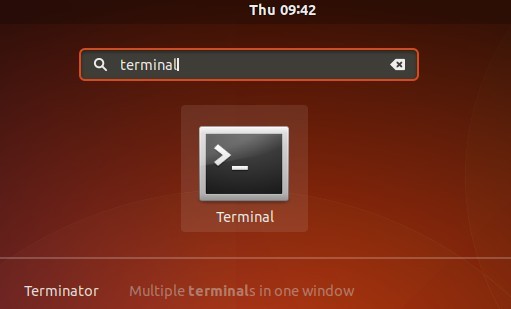

- #Check ethernet status on ubuntu via terminal install#
- #Check ethernet status on ubuntu via terminal software#
Instead, we can scan our own system by specifying localhost in the command. Normally, we would specify a remote IP address for Nmap to scan. However, we can also use it to check our own system to get a quick list of what ports are open. Nmap is a network reconnaissance tool that can be used to check for open ports on remote hosts. Now we can see that systemd-resolve, cupsd, mysqld, and apache2 are the services that are utilizing the ports to listen for incoming connections. To see which processes these listening ports belong to, include the -p option in your command. The DNS port isn’t actually open, but rather it provides name resolution to applications installed on our system. These are enabled by default, so you’ll likely see them listening on your own system.

These are for DNS and Internet Printing Protocol, respectively. You’ll also see that the ss output shows ports 53 and 631 are in a listening state. These are the well known ports associated with HTTP and MySQL. We can see that our server is listening for connections on port 80, 3306, and 33060. State Recv-Q Send-Q Local Address:Port Peer Address:Port Process Let’s look at an example on our test system. We recommend using the -ltn options with the command to see concise and relevant output. It also shows which networks it’s accepting the connections from. The ss command can be used to show which ports are listening for connections. $ – requires given linux commands to be executed as a regular non-privileged user # – requires given linux commands to be executed with root privileges either directly as a root user or by use of sudo command Privileged access to your Linux system as root or via the sudo command.
#Check ethernet status on ubuntu via terminal software#
Requirements, Conventions or Software Version Used Software Requirements and Linux Command Line Conventions Category Make sure you go through the command line man pages of these commands to learn in-depth about more options.Checking for open ports on Ubuntu Linux with the ss command In this article, we described three commands that can be used to monitor and check the network load in Linux. $ sar -n DEV 2 5Ĭheck the load for other protocols such as TCP. Here, -n signifies that we are calling sar for network statistics and the ‘ Protocol’ can be IP, TCP, UDP, DEV (which shows traffic for each network interface like Ethernet or Wifi), etc. The syntax to display network traffic with sar is: $ sar -n Protocol Interval Repetitions
#Check ethernet status on ubuntu via terminal install#
In RedHat, Fedora, and other derivatives, run: $ yum install sysstatĪfter you have installed the command, run the following to enable the command to capture statistics. To install sar command in Debian, Ubuntu or other derivatives use: $ sudo apt install sysstat Check Linux Network Resource Usage with Sar CommandĪnother command which is very handy not only for network administration but also for overall system administration is the sar command, which is used for finding any kind of resource usage. Notice that it shows the packets by each protocol ( TCP, UDP), and at the top shows the summary of connections established, closed, etc. The TCP section will also show a summary of connections and packet transfers for UDP. This is a shortened output displayed in the screenshot below. netstat gives the output in more depth, while ss gives a summary of the load. To get the network load overview, you can call both netstat and ss with the flag -s. On RedHat and its derived distributions, run: $ yum install net-tools


 0 kommentar(er)
0 kommentar(er)
